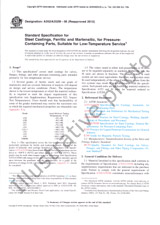We need your consent to use the individual data so that you can see information about your interests, among other things. Click "OK" to give your consent.
ASTM D3012-19
Standard Test Method for Thermal-Oxidative Stability of Polypropylene Using a Specimen Rotator Within an Oven
Translate name
STANDARD published on 1.4.2019
The information about the standard:
Designation standards: ASTM D3012-19
Publication date standards: 1.4.2019
SKU: NS-948626
The number of pages: 7
Approximate weight : 21 g (0.05 lbs)
Country: American technical standard
Category: Technical standards ASTM
The category - similar standards:
Annotation of standard text ASTM D3012-19 :
Keywords:
aging, biaxial rotator, polypropylene, thermal aging, thermal oxidative stability,, ICS Number Code 83.080.20 (Thermoplastic materials)
Additional information
| Significance and Use | ||||||||||||||||||||||||||||||||
|
5.1 Under the severe conditions of this test method, the specimens undergo degradation at a rate that is dependent upon the thermal endurance of the polypropylene material under examination. 5.2 The thermal level of this test method is considered sufficiently severe to cause failure of commercial grades of heat-stable polypropylene within a reasonable period of time. If desired, lower temperatures can be applied to estimate the performance of polypropylene materials with lower heat stability. 5.3 The technique of specimen rotation described in this test method provides an estimate of the life-temperature relationship of polypropylene. If this test method is conducted at different temperatures on the same material, a more reliable estimate of the life-temperature relationship of polypropylene is determined. This test method can be conducted at several temperatures and the data interpreted through use of the Arrhenius relation, by plotting the logarithms of times to failure against the reciprocals of the temperatures in kelvins (K). Temperatures in the range from 100 to 150°C, with intervals of 10°C, are suggested for this purpose. 5.4 The stability as determined under the prescribed test method is not directly related to the suitability of the compound for a use where different conditions prevail. 5.5 The specimen rotation technique of thermal aging increases the probability that all specimens will be exposed similarly and that the effect of temperature gradients in an oven will be minimized. |
||||||||||||||||||||||||||||||||
| 1. Scope | ||||||||||||||||||||||||||||||||
|
1.1 This test method provides a means for estimating the resistance of polypropylene, in molded form, to accelerated aging by heat in the presence of air using a forced draft oven. 1.2 The stability determined by this test method is not directly related to the suitability of the material for use when different environmental conditions prevail and shall not be used to predict performance. Note 1: The specified thermal levels in this test method are
considered sufficiently severe to cause failure of commercial
grades of heat-stable polypropylene within a reasonable period of
time. If desired, lower temperatures can be applied to estimate the
performance of polypropylene with lower heat
stabilities.
1.3 The values stated in SI units are to be regarded as the standard. The values in parentheses are for information only. 1.4 This standard does not purport to address all of the safety concerns, if any, associated with its use. It is the responsibility of the user of this standard to establish appropriate safety, health, and environmental practices and determine the applicability of regulatory limitations prior to use. Note 2: This test method and ISO 4577–1983 are technically
similar but different in preparation of test specimens, thickness
of test specimen, measurement of the number of air flow changes in
the ovens, and the number of air changes per hour
required.
1.5 This international standard was developed in accordance with internationally recognized principles on standardization established in the Decision on Principles for the Development of International Standards, Guides and Recommendations issued by the World Trade Organization Technical Barriers to Trade (TBT) Committee. |
||||||||||||||||||||||||||||||||
| 2. Referenced Documents | ||||||||||||||||||||||||||||||||
|
We recommend:
Updating of laws
Do you want to be sure about the validity of used regulations?
We offer you a solution so that you could use valid and updated legislative regulations.
Would you like to get more information? Look at this page.




 Cookies
Cookies
